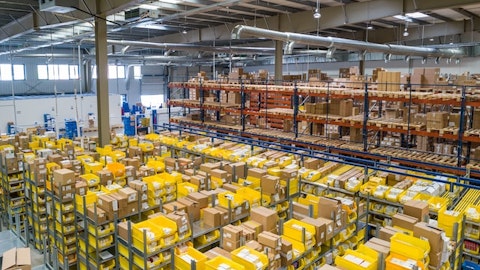Tripp Grant: No. Not in my opinion. We’ve seen a lot of optimization in fuel economy and operational expenses tied to a newer fleet. There’s no doubt about it. And Yes, service, driver satisfaction, driver retention. They all like operating younger fleets. And we saw through the COVID process, where there can be — I’m not predicting another COVID event, but there are disruptions to the supply chain. And so we have strategized and worked to lower our fleet count or lower the average age of our fleet because we feel like that gives us a total cost of ownership, the lowest total cost of ownership over the life of that asset. And I also think if we were to have a disruption for whatever reason, with obtaining new equipment, it gives us a little bit of an additional time before we start seeing service decline and higher maintenance costs and all of that.
But I understand your point and there are pockets. I mean we don’t just keep every truck for — I’ll just make up a number, 25 months or 28 months or whatever it is. We have different pockets of where different trade cycles based on how many miles the trucks are putting on them a year. And so we’re actively looking at each one of those trucks and trying to optimize the pull from it and get the most out of it on the backside and manage it well. So it’s not just depreciation expense, and I don’t think it’s debt. In terms of debt, where we are today, 250 feels a little bit high. But if you look at some of the new business growth, I think you’ll see a nice uptick in the run rate in EBITDA. So I think we’ll start spinning off more cash in the future.
As this new growth takes off to help get the leverage profile down. We’re not uncomfortable with 2x leverage. Now if we were sitting here at 3x, we may be squirming a little bit. But we’ve never really stated that we ever want to be debt-free, but we may see this — based on the plan today, I think you’ll see the debt come down a little bit in the back half of the year, but it’s nothing that gets us uncomfortable because we’re — again, I think that’s a little bit shortsighted looking at the interest costs and things like that, but I think that we’re poised to take advantage with this younger fleet to take advantage of some new growth opportunities, hopefully, when this up cycle comes, just not just in Lew Thompson, but in other areas of the group.
Paul Bunn: Jeff, let me add two things to what Tripp said. If you think about a lot of the business we’ve been adding is shorter length which is added CapEx to fund the growth is shorter length of haul business. So you’re going to — what you’re going to see is a better free cash flow profile going forward, maybe incrementally than where we’ve been because if you’re in a higher mile environment, you’re having to flip the trucks out faster in a shorter environment is Tripp saying you’re holding the trucks longer, and so you’re able to generate more free cash flow. The other thing just to think about around equipment is we’re only a couple of years away from that new engine technology being required by the EPA. And there’s what’s California going to do, what’s the EPA going to do.
There’s a lot of rules and regulations out there that not only us, but our whole industry is going to have to adjust to. But the new engine technology is probably the one that we’re most sure is probably going to stick. And the numbers you hear engine manufacturers and truck manufacturers talk about, it will be the largest price increases on trucks that this industry has ever seen. And so there’s another side of buy trucks now when they’re significantly cheaper than they’re going to be 24 months from now. And while you can get on just the Tripp’s point, there’ll be a lot of people. In the next 18 months, there will be a lot of pre-buy activity, people trying to buy equipment before the significant increase because of the new engine technology.
And we don’t want to be — we want to sit here with a young average age going into that, not raking and scraping to get every truck we need — so I hope that — maybe that’s just a little more color around your question.
Jeff Kauffman : No, I appreciate that. I mean we’re hearing 25,000 more for truck. And my recollection when you’re trying to fix NOx and particulates is the new vehicles don’t always work better than the old vehicles. So I think those are very credible points, and thank you for the detailed response.
Operator: [Operator Instructions] And there are no further questions at this time, and this will conclude today’s conference call. Thank you for attending.
Follow Covenant Logistics Group Inc. (NASDAQ:CVLG)
Follow Covenant Logistics Group Inc. (NASDAQ:CVLG)
Receive real-time insider trading and news alerts




